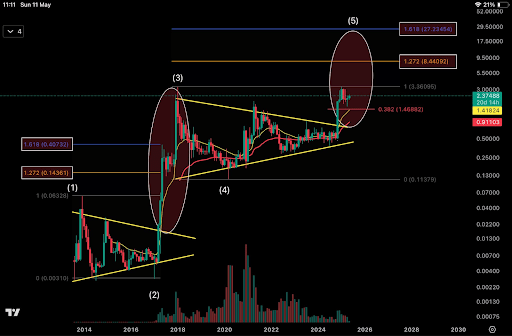Analysts believe Bitcoin could benefit from growing recession fears
The odds of an economic recession are increasing, and this might lead Bitcoin (BTC) to different outcomes, according to industry experts.
Aurelie Barthere, Principal Research Analyst at Nansen, believes the chances of a recession in the second half are higher than the historical average. She told CryptoSlate:
“I believe there is a 40% probability for a recession in H2 2024 (30% shallow, 10% hard landing). It is above the historical average of 17%.”
Her predictions are based on the fact that central banks have conducted 35 rate cuts over the last three months. For reference, when the 2009 financial crisis reached its peak, central banks executed 76 cuts.
According to Bitfinex analysts, this might affect BTC in different ways, such as investors perceiving Bitcoin as a safe haven asset during economic uncertainty. Additionally, this could prompt wider institutional participation in crypto, as institutions seek to hedge against macroeconomic risks, providing a stabilizing effect on the crypto market.
The analysts said:
“As a result, this could enhance liquidity and potentially increase the valuation of leading crypto like Bitcoin and Ethereum.”
Fideum co-founder Darren Franceschini also believes in this bullish case based on Bitcoin being seen as a hedge against economic uncertainty and inflation. He said:
“As central banks cut rates and potentially implement more accommodative monetary policies to combat recession fears, this could lead to increased liquidity in financial markets.”
Franceschini added that some of this liquidity might flow into crypto as investors seek alternative assets. Furthermore, the perception of Bitcoin and its rising popularity among the wide mainstream investor audience of “digital gold” or a store of value during economic turbulence could attract more investors to the crypto market.
On the other hand, Bitfinex analysts believe the broader crypto market and altcoins may suffer due to decreased liquidity and risk appetite. Investors may become more risk-averse, pulling funds from high-risk assets like smaller cryptocurrencies into safer investments.
They also highlighted the additional regulatory risk, as a shaky economic environment might trigger governments to apply stricter regulations aimed at protecting consumers.
Macroeconomic instability
The global economy is being pressured by multiple points of stress. Barthere highlighted that Eurozone growth has been weak since 2022 due to the energy shock from the Ukraine war and could potentially be impacted further by hypothetical tariff hikes from the US.
She added:
“Chinese growth is weakening as the country is going through the real estate bubble deflating, while the economic war with the US is not helping. In the US, growth is slowing but there is no clear area of vulnerability (household and corporate balance sheets are healthy) except for elevated equity market valuations (20.5x for the S&P 500 forward PE).”
Consequently, Barthere assesses that there’s a scenario where equity and risk assets suffer a correction deep enough to tighten financial conditions and trigger an economic contraction.
Bitfinex analysts also pointed out the yen carry trade, which caused a significant global market collapse after an increase in borrowing rates in Japan. The yen carry trade involves borrowing in Japanese yen at low interest rates to invest in higher-yielding assets in other jurisdictions.
Therefore, when investors anticipate a rise in the yen’s value or a decrease in global asset returns, they unwind these trades by selling off their high-yield assets and repaying yen-denominated loans.
According to the analysts:
“Over the last 10 days, the yen appreciated significantly against the US dollar while borrowing rates increased. This caused traders and investors who had been participating in the carry trade to liquidate their stock market positions globally to be able to pay back their loans.”
This movement led to a sudden unwinding, which further contributed to the sharp appreciation of the yen and triggered a sell-off across global markets as investors rushed to cover their positions.
The Bitfinex analysts share Barthere’s perspective about the plausibility of the fear involving a global recession. As major points of concern, they highlight economic growth projections remaining tepid, the substantial amount of speculative-grade debt maturing in the US in 2024, and the geopolitical risks around the globe, such as the recent tensions in the Middle East involving Israel, Iran, and Palestine.
Franceschini also believes that the fear of a global recession is justified. However, he noted that major central banks like the Fed and European Central Bank (ECB) are still proceeding cautiously, with the Fed potentially considering its first 25 basis point cut after holding rates steady for a year.
According to Franceschini:
“This could suggest that while there are latent economic concerns rising, policymakers are not yet treating the situation as dire or insecure as the 2009 crisis,”
The post Analysts believe Bitcoin could benefit from growing recession fears appeared first on CryptoSlate.



